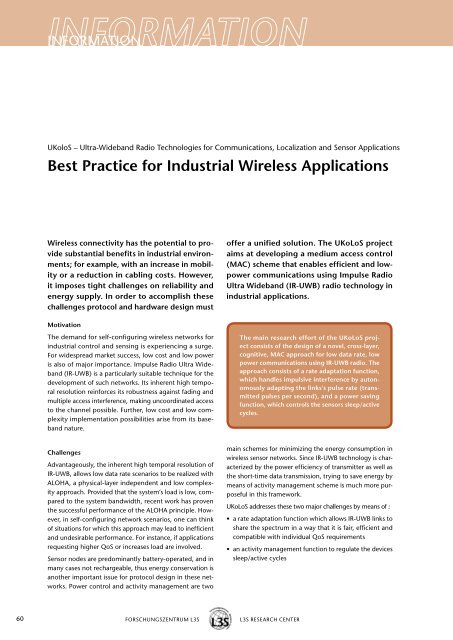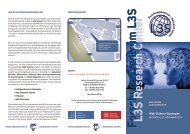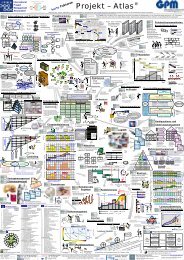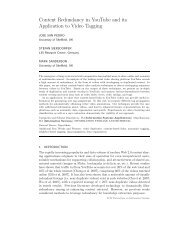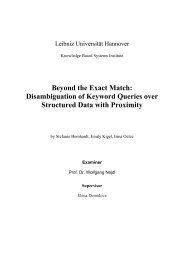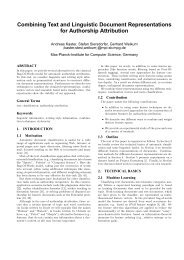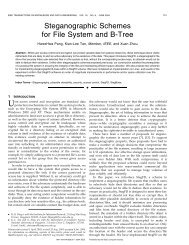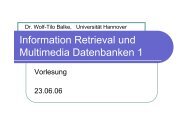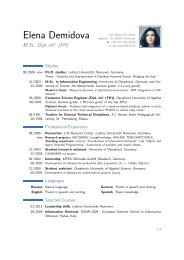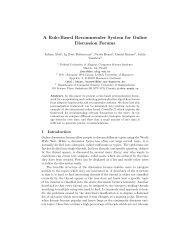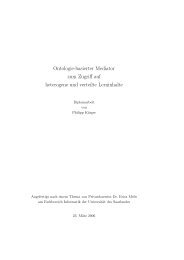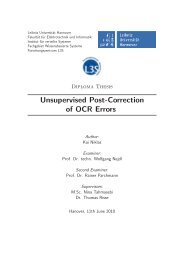knowledge · information · learning - Forschungszentrum L3S
knowledge · information · learning - Forschungszentrum L3S
knowledge · information · learning - Forschungszentrum L3S
You also want an ePaper? Increase the reach of your titles
YUMPU automatically turns print PDFs into web optimized ePapers that Google loves.
60<br />
INFORMATION<br />
UKoloS – Ultra-Wideband Radio Technologies for Communications, Localization and Sensor Applications<br />
Best Practice for Industrial Wireless Applications<br />
Wireless connectivity has the potential to provide<br />
substantial benefits in industrial environments;<br />
for example, with an increase in mobility<br />
or a reduction in cabling costs. However,<br />
it imposes tight challenges on reliability and<br />
energy supply. In order to accomplish these<br />
challenges protocol and hardware design must<br />
Motivation<br />
The demand for self-configuring wireless networks for<br />
industrial control and sensing is experiencing a surge.<br />
For widespread market success, low cost and low power<br />
is also of major importance. Impulse Radio Ultra Wideband<br />
(IR-UWB) is a particularly suitable technique for the<br />
development of such networks. Its inherent high temporal<br />
resolution reinforces its robustness against fading and<br />
multiple access interference, making uncoordinated access<br />
to the channel possible. Further, low cost and low complexity<br />
implementation possibilities arise from its baseband<br />
nature.<br />
Challenges<br />
Advantageously, the inherent high temporal resolution of<br />
IR-UWB, allows low data rate scenarios to be realized with<br />
ALOHA, a physical-layer independent and low complexity<br />
approach. Provided that the system’s load is low, compared<br />
to the system bandwidth, recent work has proven<br />
the successful performance of the ALOHA principle. However,<br />
in self-configuring network scenarios, one can think<br />
of situations for which this approach may lead to inefficient<br />
and undesirable performance. For instance, if applications<br />
requesting higher QoS or increases load are involved.<br />
Sensor nodes are predominantly battery-operated, and in<br />
many cases not rechargeable, thus energy conservation is<br />
another important issue for protocol design in these networks.<br />
Power control and activity management are two<br />
FORSCHUNGSZENTRUM <strong>L3S</strong> <strong>L3S</strong> RESEARCH CENTER<br />
offer a unified solution. The uKoLoS project<br />
aims at developing a medium access control<br />
(MAC) scheme that enables efficient and lowpower<br />
communications using Impulse Radio<br />
ultra Wideband (IR-uWB) radio technology in<br />
industrial applications.<br />
The main research effort of the uKoLoS project<br />
consists of the design of a novel, cross-layer,<br />
cognitive, MAC approach for low data rate, low<br />
power communications using IR-uWB radio. The<br />
approach consists of a rate adaptation function,<br />
which handles impulsive interference by autonomously<br />
adapting the links’s pulse rate (transmitted<br />
pulses per second), and a power saving<br />
function, which controls the sensors sleep/active<br />
cycles.<br />
main schemes for minimizing the energy consumption in<br />
wireless sensor networks. Since IR-UWB technology is characterized<br />
by the power efficiency of transmitter as well as<br />
the short-time data transmission, trying to save energy by<br />
means of activity management scheme is much more purposeful<br />
in this framework.<br />
UKoLoS addresses these two major challenges by means of :<br />
• a rate adaptation function which allows IR-UWB links to<br />
share the spectrum in a way that it is fair, efficient and<br />
compatible with individual QoS requirements<br />
• an activity management function to regulate the devices<br />
sleep/active cycles


